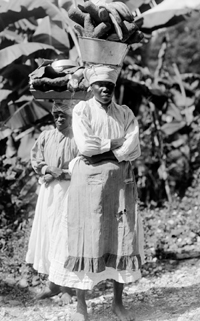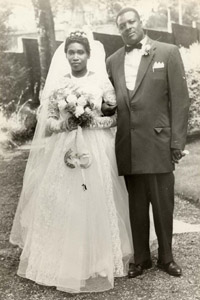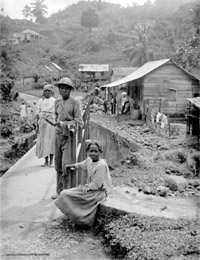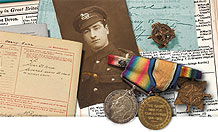Tracing Caribbean Roots (Courtesy of MovingHere.org.uk)
Menu Options
"West Indians: Out of Many, One People" (Jamaican Motto)
The former British West Indies are among a chain of volcanic and coral islands stretching from Florida to Venezuela across the Caribbean Sea. They include Anguilla, Antigua, Bahamas, Barbados, British Virgin Islands, Cayman Islands.

Moving Here catalogue reference (RGS) S0001570
An early 20th-century photograph of two women in Jamaica. They are carrying what appear to be plantains (a type of banana first introduced by the Spanish) and yams, an edible starchy tuber. Since the 1790s, under British colonial rule, both plantains and yams had been grown on a large scale in Jamaica because of the high cost of importing food from America.
Dominica, Grenada, Jamaica, Montserrat, St Kitts and Nevis, St Lucia, St Vincent and the Grenadines, Trinidad and Tobago, and the Turks and Caicos Islands. Because of the historic links between the British West Indies and Belize and Guyana in Central and South America, people from these countries are also considered to be West Indian or Caribbean.
When Europeans first discovered the West Indies in 1492 most of the islands had indigenous populations. The Portuguese and Spanish enslaved many of these Amerindians to work on plantations and in the gold mines of South America. Large numbers of people also died in the violence of invasion and of disease brought by the Europeans against which they had no resistance.
By the mid-17th century the indigenous population of Jamaica had been considerably reduced, although St Lucia, Dominica, St Vincent and Tobago still had large numbers of indigenous people. Indeed, on St Lucia, St Vincent and Tobago, the Caribs, one of the two indigenous groups in the West Indies, managed to resist European expansion until the 18th century.
Caribbean Amerindian Centrelink is an online resource for the Caribbean Amerindian communities.
The Spanish were the earliest European settlers in the Caribbean, although they did not establish settlement on most of the islands. The Americas were 'beyond the line': they lay outside the territorial limits of European treaties, and disputes in the Americas did not invalidate peace treaties in Europe.

Moving Here catalogue reference (PRO) INF10/40/009
Two members of the harbour police force in Bridgetown, Barbados on duty in 1955. Their responsibilities included enforcement of the quarantine laws and the prevention of smuggling. Their uniform was similar to that worn by sailors in the Royal Navy at the time of Nelson, some 150 years earlier.
While the Spanish tried to keep other European powers out of America, the allure of gold, which was intensified by myths such as Eldorado acted as a magnet to adventurers and pirates. During the 17th and 18th centuries other European powers, predominantly the Dutch, French, British and Portuguese, and to a lesser extent the Danes and Swedes, challenged Spanish claims to the Americas and settled on many Caribbean islands, and in parts of North and South America.
Until the mid-19th century, regular territorial disputes and European wars meant that control of the islands frequently changed hands between one European power and another. On islands captured by Britain from the Spanish, French and Dutch, there was little or no attempt to expel all the non-British. During the French Revolution and Spanish-American independence, many refugees fled to so-called friendly British islands.
The majority of Caribbean people are immigrants and comprise a diverse population of Caribbean Amerindians and the descendants of African, Dutch, Spanish, British, Portuguese, Lebanese, Chinese, Danish, Asian Indian, German and French settlers.
The largest ethnic groups in Anglo-Caribbean countries are people of African, British and Asian-Indian descent.

A young couple photographed on their wedding day in Birmingham in the early 1960s. The photograph is from the Ernest Dyche Collection.
The term West Indian was originally used to describe not only a person born or settled in the West Indies but also someone who was just living in Britain and had an interest in the West Indies (such as a merchant or absentee planter). Such people may never have left Britain but are referred to as West Indian merchants.
Since the settling of Caribbean countries in the 17th century Caribbean people have returned or migrated to Britain. Many planters and merchants sent their children to school in Britain and may themselves have retired to Britain, bringing their servants, including slaves, with them. West Indian merchant seamen, soldiers and sailors were often discharged in the UK and decided to remain, and many arrived as businessmen and students.
White Caribbean migrants were soon integrated into the British population and society, something black Caribbean migrants could not easily do because of their colour. Also, most early black Caribbean settlers were men who were, for example, discharged soldiers, sailors and students.
There were no Caribbean communities and when they settled and raised a family it was usually with white women. Similarly seamen who did not settle would have had relationships with white women. This had an effect of lightening the black population and after several generations descendants would be considered white.
Although Caribbean people have settled in the UK for over 300 years it was not until 1948 that large numbers migrated to the UK and this is demonstrated in the census returns, 1891-1951. It is not possible to identify ethnic origin here although it can be assumed that the majority of migrants were of African descent and to a lesser extent European and Asian.
The techniques and sources for researching Caribbean families are essentially the same whether you are starting with a family in the UK, USA, Canada or in the Caribbean. You may find it useful to read our first steps in family history section for tips.
- First of all start with what you know about yourself and immediate family
- Talk to family members to find out dates of births, marriages and deaths of parents, aunts and uncles, grandparents and other such details.
- Try to find the official names; many people from the Caribbean use family and pet names, which are different from their official names as used by employers and the state - you will need to know the official names in order to find out further information from religious, employment or government documents.
- Try to find out where the events happened; this is important because there are 20 Anglo-Caribbean countries and each has their own records and archive offices - in the UK there are separate archive offices for events that occurred in Scotland, Ireland or in England and Wales.
- Collect or copy photographs, birth and baptism certificates, family letters, family bibles, and family trees; listen to family tales and oral traditions, which if not totally factual may have some truth in them.
At some point your research will take you beyond your immediate family and you will need to visit archives, register offices, religious institutions and libraries. In order to do this you need to know:
- Where your family is from, and ideally the parish or village. Click here for some tips on how to find the Caribbean island of your ancestors.
- Approximately when they lived there
It will also be useful if you know:
- Religious denomination
- Ethnic group(s)
- Occupation
The sources you will start searching will be dependant on the information you know already but they will include:
- Life Events These include the records of births, marriages and deaths, and will be records by the church or state, census returns, and the probate and administration of personal property and estate after death.
- Occupational Records
- Land and Property Records
- Migration Records These include immigration to the Caribbean and emigration from the Caribbean.
- Records of Slavery This group of people has been described separately because until the 20th century they formed the largest ethnic group in most of the Anglo-Caribbean countries and until 1834 most were unfree.
- Other Records A selection of miscellaneous sources, such as newspapers and early official gazettes, electoral registers, deeds registers and Colonial Office records.
- The records of the Colonial Office have information on all manners of colonial life - touching upon economic, military, social and political aspects. There are also numerous references to individuals.
- Other sources of information for tracing Caribbean Roots such as newspapers, useful books and websites.
Why not read a story, contributed by Ruth Crook, which may give you some insight into how best to start your family history research.
- It is not always possible to identify people who are from the Caribbean. West Indians have European or Asian surnames and first names.
- UK records rarely say where someone was born or their ethnic origin. For example, a UK census return under the heading 'Where born' may only say 'West Indies' and occasionally this may be annotated with 'BS' or 'British Subject'.
- Britain does not hold the domestic (locally created) records of her dependencies and former colonies. There are no unified records and most records for family historians, if they survive, are to be found in the archives and register offices of the relevant country. Many have been microfilmed by the Church of the Latter-day Saints. Read more on the Church of the Latter Day Saints. However, The National Archives holds the records of the Colonial Office Colonial Office and other departments which touch upon Caribbean affairs. There are many records that compliment and duplicate material that no longer survives in the Caribbean.
- Local Caribbean
records are incomplete. Many historical records have been lost through neglect, poor record-keeping practices and fire - fates familiar to researchers in Britain. Most of the losses,
however, are due to two major factors which will not be experienced by researchers in Britain:
- War and Invasion - This often led to the destruction of public and private buildings, estates and personal property and the migration of victors and the defeated.
- Tropical Climate - High humidity, tropical insects and tropical storms, especially hurricanes, are a significant cause for the loss of records. In addition many of the islands experience earthquakes and volcanic eruptions.
- Local records are not centralised and each county has its own archives, libraries and registry offices.
- Records (in the UK and in the Caribbean) are not always written in English: those countries which were conquered or ceded to Britain still used Dutch, Spanish or French in official correspondence and legal documents for many years afterwards.
- Many Caribbean countries were captured from or ceded by other European powers and records of their pre-British history may survive in national and provincial archives in other countries.
- Write everything down and include the source such as family bible, archive address and reference; you may also find it useful to record sources for which you did not find any information.
- Respect people's wishes: if they do not want to give you information do not press them.
- And last but by no means least - check the original material whenever possible as errors may have crept into indexes or transcripts.

A group of Maroons in theiir village in Jamaica around 1910. The Maroons are the descendants of run-away slaves from the days of Spanish colonial rule. They became guerilla fighters and in 1739 a peace treaty was made between them and the British recognising the Maroons as a free people and giving them a grant of land.
Moving Here catalogue reference (RGS) S0001583
With the exception of a minority of surviving Caribbean Amerindians in the Caribbean and in Central and South America most people from the Caribbean are immigrants. Therefore, the culmination of your research may be to find the country of origin for your Caribbean ancestors. If you are lucky enough to find clues to the homeland for your West Indian ancestors you will be able to start researching archives in that country. If your ancestor migrated before the 18th century you may also need to know from which town, village or parish he or she left because most records were generated by religious or local authorities rather than centralised by the state. However, not all countries recorded events in legal documents and you may need to research oral evidence and traditions.
Each country is independently governed and therefore each country maintains its own archives and register offices. There are no union indexes or lists of families who lived on the islands.
- One place to start is the Caribbean Surnames List at www.candoo.com/surnames/index. This is an index to West Indian families being researched and includes the country of interest.
- Search telephone directories to find islands with greatest coverage of that family name. Many residential telephone directories (white pages) are online, for example at www.teldir.com. You still need to search country by country.
- Post a message on the Caribbean GenWeb Project mailing list at www.rootsweb.com/~caribgw/mailinglist or to the newsgroup soc.genealogy.west-indies.
Paul Crooks was raised a stone's throw from Wembley Football Stadium and now lives not far away with his wife and daughter. He started searching for his African slave ancestors after being told it was not possible and it has taken him thirteen years of research to trace them. After his lengthy and arduous research, Paul gathered all the facts and wrote the book Ancestors. Read this personal account of Paul Crooks about his search for his predecessors and where he found them!
Creator: Guy Grannum

